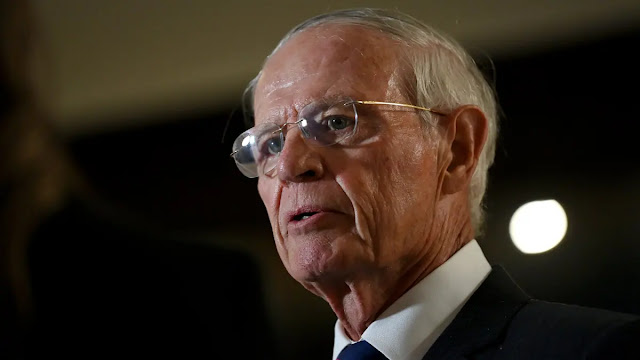 |
| Former Chief of Australian Defence Force, Admiral Chris Barrie during a press conference at the Fuel Security Summit in Sydney. (AAP Image/Bianca De Marchi). |
by Michael Mazengarb, first published at RenewEconomy
National security experts have called on Australian voters to use the federal election to support candidates that back strong action on climate change, saying Australia has “squandered” the last two decades.
Speaking at the Smart Energy Council’s Emergency Fuel Summit in Sydney, retired admiral Chris Barrie described climate change as the single biggest threat to Australia’s national security. Barrie currently serves on the Australian Security Leaders Climate Group and said the group saw national climate policy failures as putting Australia at risk.
“We consider that climate change now represents the greatest threat to the future and security of Australia,” Barrie said.
“Australia currently has no credible climate policy, leaving our nation unprepared for an increasingly harsh impacts.”
Barrie, who served as the chief of the Australian Defence Force between 1998 and 2002, said that climate change had emerged as an existential threat to humanity and that governments had an obligation to address such threats in order to protect lives.
“Dealing with climate change is a very significant security issue. It is in this context that I would argue the first responsibility of government is towards the security of the people,” Barrie told the summit. “And I mean by this the security of Australians in Australia.”
“When we canvased the performance of the federal government over the past few years, the Australian Security Leaders Climate Group has stated publicly that the first duty of government is to protect the people, but on climate security risks and Australia is missing an action,” Barrie added.
Barrie spoke at a forum that heard from a trio of independent candidates – Zali Steggall, Allegra Spender and Kylea Tink – who pledged to push the major parties to implement vehicle emissions standards to boost Australia’s energy security and help drive down emissions in the transport sector.
Barrie – who also took aim at the Morrison government’s diplomatic failure to engage with Pacific Island neighbours on the issue of climate change – said the 2022 federal election would serve as the most important election ever on the issue of climate change, given it will decide who will govern Australia through a crucial period to 2025, when greenhouse gas emissions need to be slashed.
“Australia has squandered two decades over which opportunities for a progressive transition to a better energy base are available,” Barrie said.
“This is why I put it to you now; my belief that the election next month will be the most important election in my lifetime. I think that voters throughout Australia must take responsibility for how they cast their vote.”
“If the next parliament fails to grapple with climate change effectively, we will not have the opportunity in 2025 to recover from this dire situation. Moreover, the legacy we will leave for future generations of Australians will be an ugly one, and there is no one we can blame for this but ourselves.”
“Please take seriously the urgency of the situation we’re confronting and work hard to inspire friends, family members, and work colleagues to take the call for action seriously now,” Barrie added.
Speaking at the same forum, former director of preparedness and mobilisation at the Department of Defence, Cheryl Durrant, said that it was important that Australian political leaders make climate policy decisions based on building hope rather than stoking fear.
“It is crisis code read for humanity, and we might want those wasted decades back again, but we can’t have them back,” Durrant said.
“What has really concerned me in the last two years… is that the element of fear is beginning to dominate. And fear is one of those things that is really insidious to decision making.”
“So, as we design a better system, we need to think about how we de-escalate the fear in the system because that fear will consume us.”
“We make bad decisions when we’re under threat. If we go back to the fundamentals of what security actually is, it’s freedom from harm. So that has to be part of the plan,” Durrant added.
